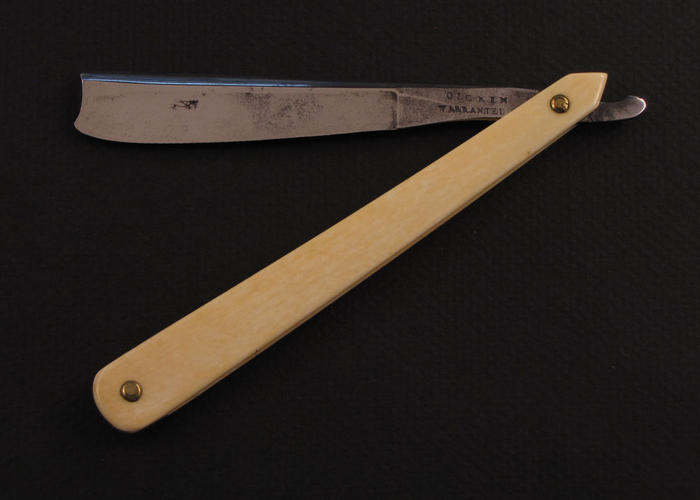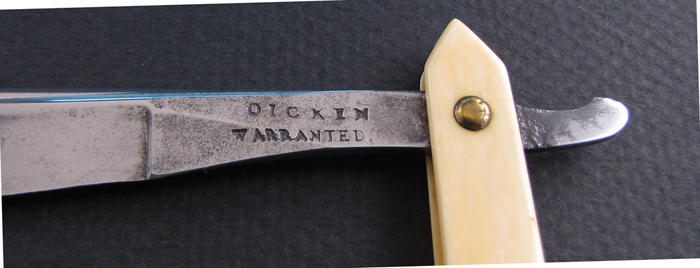Results 1 to 10 of 30
-
07-29-2013, 09:10 PM #1
 Question for English Razor Experts - Any Info on Dicken?
Question for English Razor Experts - Any Info on Dicken?
Hi all,
I've got an old razor marked "Dicken," dating sometime around 1790-1810. Neither my books nor Google have been any help with this one. But despite knowing nothing about the maker, I'd be willing to bet money it's English made.


If anyone knows anything about this maker, I'd greatly appreciate hearing about it.
-
07-29-2013, 10:19 PM #2

Can't help you with any info but that sure is one fine stub tail. I'd guess it was an English made blade too. Neil Miller, Martin 103 or manah will be along and if anyone can dig up the dirt on Dicken, they can. BTW, I've got a couple of those old late 1700s pieces and I do shave with them. Just watch out your thumb pad doesn't creep past the tang. No wonder they figured out to have a distinct tang by the early 1800s.

-
07-29-2013, 10:57 PM #3Senior Member



- Join Date
- Apr 2008
- Location
- Essex, UK
- Posts
- 3,816
Thanked: 3164
Could be Isaac Dicken, a cutler from Aston, Birmingham. He seems to have died in 1743 though, which may be a bit on the early side. Maybe the profession was handed down the generations, though.
Regards,
NeilLast edited by Neil Miller; 07-29-2013 at 11:15 PM.
-
The Following User Says Thank You to Neil Miller For This Useful Post:
Hanlon (07-30-2013)
-
07-29-2013, 11:00 PM #4Historically Inquisitive



- Join Date
- Aug 2011
- Location
- Upstate New York
- Posts
- 5,782
- Blog Entries
- 1
Thanked: 4249
I did find a cutler from Birmingham, named Isaac Dicken that would work for that time frame, late 1700's.
That razor is in really good condition. Was much done to it?
-
The Following User Says Thank You to Martin103 For This Useful Post:
Hanlon (07-30-2013)
-
07-29-2013, 11:08 PM #5

Those are some beautiful and well preserved ivory scales!
-
07-30-2013, 01:39 AM #6

Well, I've got a full beard, so no shaving with it for me. Although, I know what you mean about the potential for the thumb slipping. You're a brave man for shaving with blades like that!
Thanks - I was impressed with its condition too. I haven't done anything to it myself (minus a quick wipe down and a coat of simichrome polish on the blade). It seems it's just been well cared for throughout its life.
Also, Martin and Neil, thanks for the info about Isaac Dicken. Makes me feel that if it wasn't Isaac himself, perhaps the razor was made by a son or a grandson of his.
-
07-30-2013, 12:02 PM #7Senior Member



- Join Date
- Apr 2008
- Location
- Essex, UK
- Posts
- 3,816
Thanked: 3164
RE: Isaac Dicken-
He lived in a district of Aston known as Deritend. Aston was a very old settlement, divided into two places, near Birmingham, Warwickshire, before the area was reclassified as the Midlands. A description of the town centre from that time describes Deritend as having "...many smyths and cutlers working in open-fronted forges..." so it was definitely well-known for early cutlery.
Isaac was married to Elizabeth. His will, dated 1742 mentions no children, only a nephew called Samuel Dicken and a sister called Susannah Dicken, who was a widow. When he died in 1743 these were the only family members who received an inheritance, so I presume he had no children and that it must have been Samuel's side of the family who continued the business.
There is an old manuscript about the early settlers of Virginia that may be of interest. A descendent of the original founder from Spotsylvania Co. with the same name - John Graves - was married to an emigrant called Susannah Dicken. The dates of the marriage, and John's early death, are recorded - but useless. It seems that they adopted a dating system based on the bible, so we cannot compare dates effectively. Suffice it to say that susannah Dicken outlived John Graves and may have been "...my sister, Susannah Dicken, widow..." referred to in Isaac's will. She is supposed to have been born in 1714, which brings her into the same timeframe. Lending some support to this admittedly 'loose' supposition is that she named one of her sons Isaac.
Regards,
Neil
-
The Following User Says Thank You to Neil Miller For This Useful Post:
Hanlon (07-30-2013)
-
07-30-2013, 03:22 PM #8

Neil, I am constantly amazed at your facility with finding these old documents and your wealth of sources.
 (You don't by chance happen to live in a library, do you?)
(You don't by chance happen to live in a library, do you?)
-
07-30-2013, 08:17 PM #9

Just to add a little confusion to the matter (which really, we all just love, don't we?) there was also a Samuel Dicken, son of Silas Dicken who hailed from Bakewell. Young Samuel was apprenticed to Peter Goite (or maybe Gyte), a general cutler in Sheffield. The apprenticeship began in 1785 and Samuel was freed in 1797.
The razor certainly looks like one made not long after 1797, but I consider just a mention in the Cutler's Company's apprentice rolls to be pretty tenuous evidence. I can't find any other information about Samuel Dicken in Sheffield.
Maybe he learned the trade and then moved back to Bakewell? Can't find anything through Ancestry either.-Zak Jarvis. Writer. Artist. Bon vivant.
-
-
07-30-2013, 10:55 PM #10

Bring on the confusion! The vague and shadowy possibilities of history beat knowing nothing any day.



 54Likes
54Likes LinkBack URL
LinkBack URL About LinkBacks
About LinkBacks






 Reply With Quote
Reply With Quote
